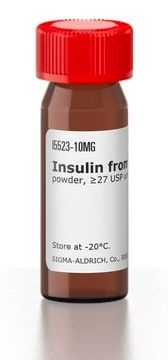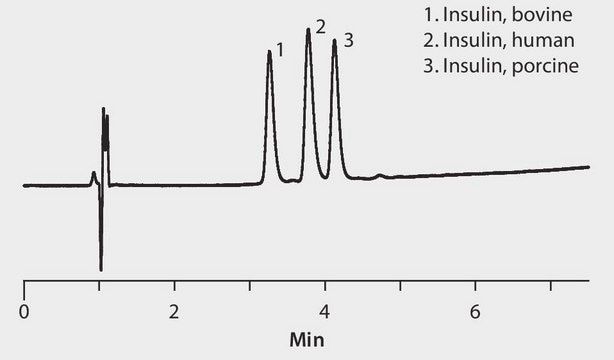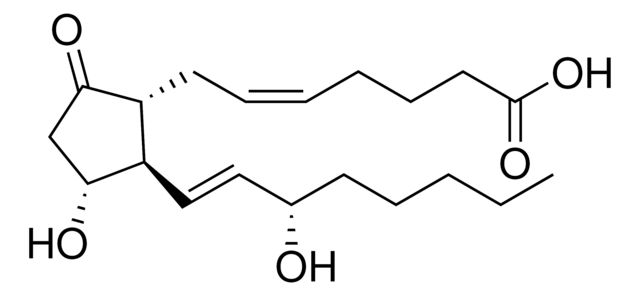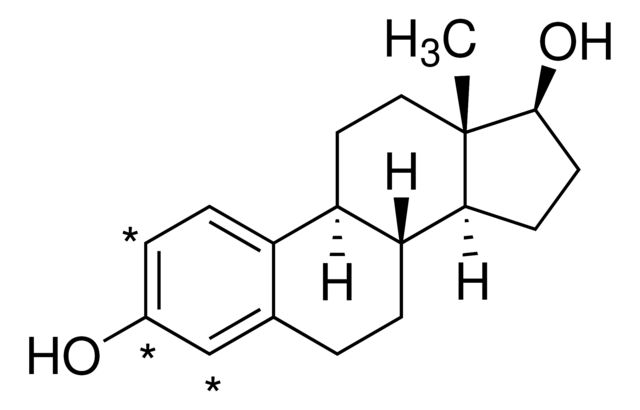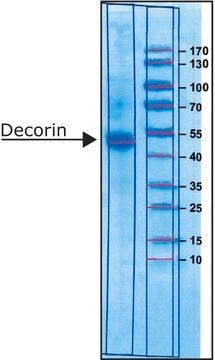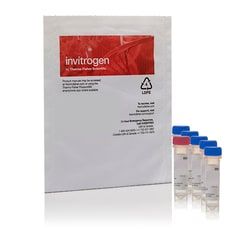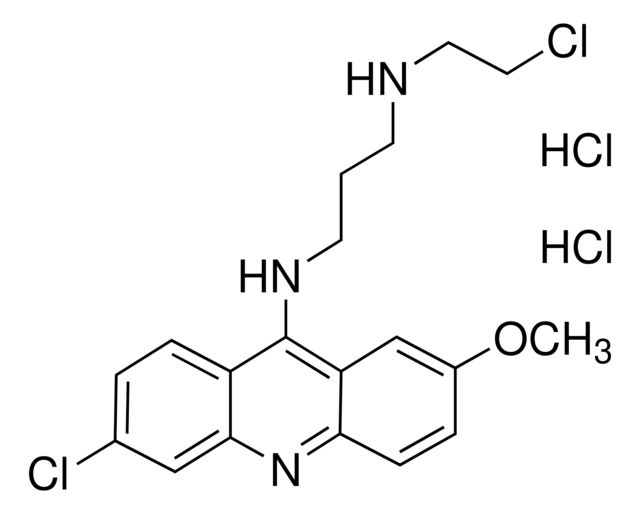I3536
Insulin human
recombinant, expressed in yeast, γ-irradiated, suitable for cell culture
Manufacturer: Sigma Aldrich
CAS Number: 11061-68-0
Synonym(S): Insulin human
Select a Size
| Pack Size | SKU | Availability | Price |
|---|---|---|---|
| 100 MG | I3536-100-MG | In Stock | ₹ 81,858.65 |
I3536 - 100 MG
In Stock
Quantity
1
Base Price: ₹ 81,858.65
GST (18%): ₹ 14,734.557
Total Price: ₹ 96,593.207
recombinant
expressed in yeast
Quality Level
200
sterility
γ-irradiated
form
lyophilized powder
potency
≥25 USP units per mg
technique(s)
cell culture | mammalian: suitable
solubility
0.01 M HCl: 20 mg/mL, clear, colorless to faintly yellow
UniProt accession no.
P01308
shipped in
ambient
storage temp.
−20°C
Other Options
| Image | Product Name | Manufacturer | Price Range | |
|---|---|---|---|---|
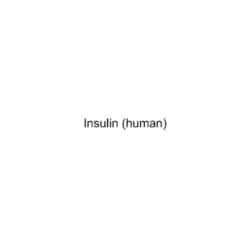 | Medchemexpress LLC HY-P0035 100mg , Insulin (human) CAS:11061-68-0 Purity:>98% | Medchemexpress LLC | ₹ 11,214.00 | |
 | Medchemexpress LLC HY-P0035 25mg Medchemexpress, Insulin (human) CAS:11061-68-0 Purity:>98% | Medchemexpress LLC | ₹ 7,008.75 | |
 | Sigma Aldrich Fine Chemicals Biosciences Insulin Human | 11061-68-0 | MFCD00131380 | 50mg | Sigma Aldrich Fine Chemicals Biosciences | ₹ 22,568.62 | |
 | CERILLIANT™ Human Insulin Solution, 100 μg/mL in PBS, Sold by MilliporeSigma™ Supelco™ | MilliporeSigma Supelco | -- | |
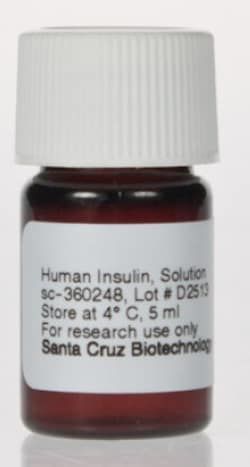 | Santa Cruz Biotechnology Human Insulin | 11061-68-0 | MFCD00131380 | 5 mL | Santa Cruz Biotechnology | ₹ 18,534.25 | |
 | Human Insulin solution | Supelco | ₹ 15,906.80 | |
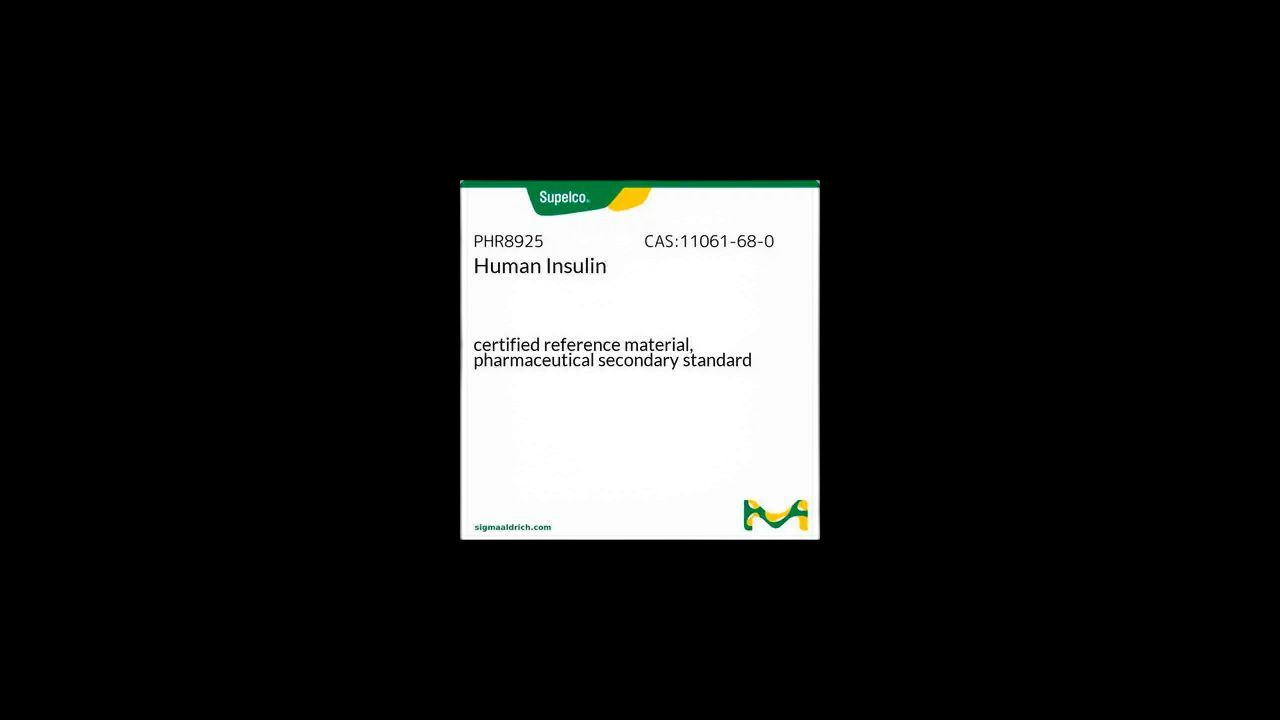 | Human Insulin | Supelco | ₹ 19,571.60 | |
 | Insulin solution human | Sigma Aldrich | ₹ 24,399.55 | |
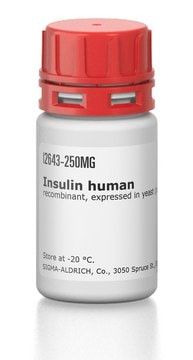 | Insulin human | Sigma Aldrich | ₹ 18,540.00 - ₹ 87,173.73 | |
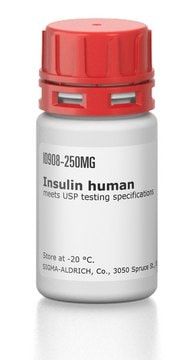 | Insulin human | Sigma Aldrich | ₹ 14,862.73 - ₹ 24,702.65 |
Description
- General description: The INS gene encodes for preproinsulin, which is enzymatically converted into insulin.[1] Insulin is produced in the insulin-producing pancreatic β cells.[2] Preproinsulin is converted to proinsulin in ER and proinsulin is then proteolytically processed to form insulin in newly-forming insulin secretory granules.[3] Insulin production is tightly regulated by specific DNA elements present within ∼400 bp in the proximal region of the INS promoter.[4]
- Application: Insulin human has been used for the following applications: For adipogenic differentiation assays (in the preparation of medium supplement)[5]Incubation of cells for the evaluation of the effects of insulin[6]Mass spectrometry (used for the external caliberation)[7]
- Biochem/physiol Actions: Insulin is responsible for two types of actions- excitatory and inhibitory. In its excitatory role, it increases the uptake of glucose and lipid synthesis, and in its inhibitory role it inhibits glycogenolysis, gluconeogenesis, lipolysis, proteolysis and ketogenesis.[8] Aberrant insulin secretion leads to various disorders such as diabetes, hyperglycemia or hypoglycaemia.[2] Type I diabetes is a result of autoimmune destruction of β cells of pancreas, which leads to depletion of insulin.[9] Mutant INS-gene Induced Diabetes of Youth (MIDY) syndrome is an autosomal dominant disorder caused by missense mutations, which lead to aberrant proinsulin folding.[3] Impaired glucose tolerance (IGT) or non-insulin-dependent diabetes mellitus (NIDDM) is caused by resistance to insulin-stimulated glucose uptake.[10]
- Other Notes: InChI: 1S/C257H383N65O77S6/c1-29-131(23)205(313-193(339)104-259)252(393)317-204(130(21)22)248(389)288-159(75-82-200(349)350)217(358)282-156(71-78-189(263)335)221(362)308-183-116-403-404-117-184-243(384)305-178(111-324)240(381)294-162(88-123(7)8)225(366)295-168(95-140-53-61-146(329)62-54-140)228(369)283-154(69-76-187(261)333)218(359)290-161(87-122(5)6)223(364)285-158(74-81-199(347)348)220(361)302-174(101-190(264)336)235(376)298-170(97-142-57-65-148(331)66-58-142)231(372)309-182(242(383)304-176(255(396)397)103-192(266)338)115-402-401-114-181(214(355)273-107-194(340)278-153(72-79-197(343)344)216(357)281-151(51-42-84-271-257(267)268)212(353)272-108-195(341)279-166(93-138-46-36-32-37-47-138)227(368)297-167(94-139-48-38-33-39-49-139)230(371)299-171(98-143-59-67-149(332)68-60-143)238(379)320-208(135(27)327)254(395)322-85-43-52-186(322)246(387)286-152(50-40-41-83-258)222(363)321-209(136(28)328)256(398)399)311-250(391)203(129(19)20)316-236(377)164(90-125(11)12)292-229(370)169(96-141-55-63-147(330)64-56-141)296-224(365)160(86-121(3)4)289-210(351)133(25)277-215(356)157(73-80-198(345)346)287-247(388)202(128(17)18)315-237(378)165(91-126(13)14)293-233(374)173(100-145-106-270-120-276-145)301-239(380)177(110-323)280-196(342)109-274-213(354)180(113-400-405-118-185(310-244(183)385)245(386)319-207(134(26)326)253(394)306-179(112-325)241(382)318-206(132(24)30-2)251(392)312-184)307-226(367)163(89-124(9)10)291-232(373)172(99-144-105-269-119-275-144)300-219(360)155(70-77-188(262)334)284-234(375)175(102-191(265)337)303-249(390)201(127(15)16)314-211(352)150(260)92-137-44-34-31-35-45-137/h31-39,44-49,53-68,105-106,119-136,150-186,201-209,323-332H,29-30,40-43,50-52,69-104,107-118,258-260H2,1-28H3,(H2,261,333)(H2,262,334)(H2,263,335)(H2,264,336)(H2,265,337)(H2,266,338)(H,269,275)(H,270,276)(H,272,353)(H,273,355)(H,274,354)(H,277,356)(H,278,340)(H,279,341)(H,280,342)(H,281,357)(H,282,358)(H,283,369)(H,284,375)(H,285,364)(H,286,387)(H,287,388)(H,288,389)(H,289,351)(H,290,359)(H,291,373)(H,292,370)(H,293,374)(H,294,381)(H,295,366)(H,296,365)(H,297,368)(H,298,376)(H,299,371)(H,300,360)(H,301,380)(H,302,361)(H,303,390)(H,304,383)(H,305,384)(H,306,394)(H,307,367)(H,308,362)(H,309,372)(H,310,385)(H,311,391)(H,312,392)(H,313,339)(H,314,352)(H,315,378)(H,316,377)(H,317,393)(H,318,382)(H,319,386)(H,320,379)(H,321,363)(H,343,344)(H,345,346)(H,347,348)(H,349,350)(H,396,397)(H,398,399)(H4,267,268,271)/t131-,132-,133-,134+,135+,136+,150-,151-,152-,153-,154-,155-,156-,157-,158-,159-,160-,161-,162-,163-,164-,165-,166-,167-,168-,169-,170-,171-,172-,173-,174-,175-,176-,177-,178-,179-,180-,181-,182-,183-,184-,185-,186-,201-,202-,203-,204-,205-,206-,207-,208-,209-/m0/s1
SAFETY INFORMATION
Storage Class Code
13 - Non Combustible Solids
WGK
WGK 2
Flash Point(C)
Not applicable
Compare Similar Items
Show Difference
recombinant: expressed in yeast
Quality Level: 200
sterility: γ-irradiated
form: lyophilized powder
potency: ≥25 USP units per mg
technique(s): cell culture | mammalian: suitable
solubility: 0.01 M HCl: 20 mg/mL, clear, colorless to faintly yellow
UniProt accession no.: P01308
shipped in: ambient
storage temp.: −20°C
recombinant:
expressed in yeast
Quality Level:
200
sterility:
γ-irradiated
form:
lyophilized powder
potency:
≥25 USP units per mg
technique(s):
cell culture | mammalian: suitable
solubility:
0.01 M HCl: 20 mg/mL, clear, colorless to faintly yellow
UniProt accession no.:
P01308
shipped in:
ambient
storage temp.:
−20°C
